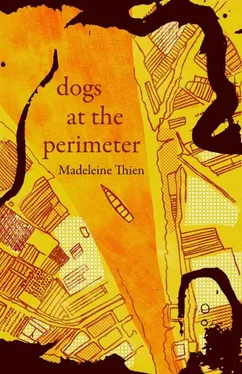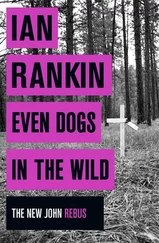The prisoners arrived blindfolded and tied with rope. My brother studied them as each session began, chilled and fascinated. One night, Prasith arrived. My brother saw his friend helped down, gently, from a truck. His interrogator asked Prasith to give a biography and to name all the remaining members of his family. Then he had to repeat his life story, over and over. Kosal had betrayed Prasith before he died. The teenager was corrupt, Kosal had said, his only aim to sabotage the revolution. He had gone to school in Phnom Penh, his father had worked as a driver for the French Embassy. All this time, Prasith had kept this information hidden. During the bombings, the B-52s had spared almost no one in his village yet Prasith had somehow managed to survive. He was a traitor of the worst kind, an insect to be purged, a boy who had always put his own survival first. My brother knew this was true. Somehow, Prasith had never completely believed. Maybe Angkar was right, maybe the country had always been most vulnerable from within.
The dying always beg for water. In the prison, the interrogator’s job is to trace all lines to the enemy, to lay bare the networks of connection, and then to follow this taint to every corner of the country. My brother was taught to do this methodically, calmly, without losing control. Chea kept track of the names that surfaced during each prisoner’s interrogation. He noted them in a ledger, then he sent messages to the cooperative leaders: a sheet of white paper, folded four times, containing only names, a date, and the place of the summons.
Chea rotated the interrogators regularly. By the time my brother saw him, Prasith was already dying, his mind had come apart. He didn’t recognize Sopham.
“You must do whatever is necessary,” Chea said, turning the pages of Prasith’s file. “You must make Prasith uncertain about the question of life and death, you must let him hope that he may survive.”
Our mother had always spoken of the pralung , which is something like the idea of the soul. Sometimes, Sopham told me, the people who survived the longest in prison were the ones who had too great a pralung , too many souls, for it took so long to remove them. A body did not have to die, he learned, for the pralung to be damaged, to grow crooked, become wasted, to finally disappear. He saw people who never cried and people who wept continuously from the moment they entered the prison.
“Most beloved and respected Angkar,” Prasith had said. “Most beloved. Most respected.” His words were disjointed. “I swear to you on all that I love, I have never betrayed you. Please don’t abandon me here. I swear to you, the enemies surround us.”
My brother became familiar with the workings of the human body, with the tissue and the blood and the organs and the delicate, fragile forces that held a boy together. Cut this knot here, and the hand or the leg or the heart becomes useless. It was both mysterious and simple. Every day, my brother fought to banish all the unnecessary raging inside himself, to become as devoted and steadfast as Chea.
Before he died, Prasith told detailed, fantastic tales, he admitted freely to being a spy, he described America as a place where citizens lived on airplanes or underground, leaving the surface of the country empty as a sheet. The CIA had recruited him at a young age, he said. They had sent him messages hidden inside pieces of clothing. They had signalled to him from the cockpits of their planes. The truest believers, he said, describing the agents he worked for, were the most indifferent monsters.
My brother became obsessed with water. His throat felt parched and rough, he hallucinated about water, he hoarded it in plastic bags and left these in the fields. Sometimes he stood and gazed at the shackled enemies and drank water in front of them as if to prove it was still there, it still existed within their reach. When it rained, he sat and watched the water moving over the ledges of the concrete building, seeping into the ground, falling and falling from the nothingness above. He watched it gathering in the clay jugs behind the building where the enemy was sometimes brought to be forced down under the clear, clean water. A blessing turned into a torture.
“I just went on with all the same things,” he told me. “What did it matter if I believed or not? Ta Chea told me to think of him as my father. He said he would protect me as a father would.”
In the prison, he let music run in his head. He thought about his hero, In Yeng, the singer, and wondered what had happened to those recording studios in Phnom Penh, to the television screens and singers, to the machines and microphones and boxes of records. Music, he knew, was recorded on to strips of brown tape, tape that spun around and around a metal reel. You could store music in canisters, you could lift it in stacks. If tomorrow the Khmer Rouge disappeared and he could return home, would he go? His collection of records might still be there but he knew that when he put his fingertips to the wooden case, when he set the needle against the grooves, the record might spin and spin and leave him wanting. Now the singer would be an executed man. Now all the reels of tape would have burned away and what joy was there to be had in such a return? My brother was nine years old. He had committed murders, he told me. He had tried to save himself and he had seen things that even our father, until the end of his life, could never have imagined.
A woman named Chanya came into the prison. They kept her for three weeks and, every night, she was interrogated. Her confession was nearly complete when Chea sent my brother to her. The woman was dying, on the table where she had been shackled, her arms and legs were impossibly thin. Her voice was so weak, he had to lean over her to catch the words.
“I’m hungry,” she whispered.
“I have rice for you.”
“Please. Just a spoonful. Please.”
He gave her the rice, and then a sip of water.
“Thank you, my son. You are kind.”
The next morning, before dawn, he found himself seated beside her again. The gaps between her sentences had grown longer. He did not light the candle.
“You must tell him,” she said. Her eyes stared up at the stained, dingy ceiling.
“Tell who?”
“Your father. Your brothers.”
He hesitated, thinking. And then he said, “If only I could find them.”
“They’re in the caves.”
“Which caves?”
“You know. The place your father hid when he fought the Americans. The men are waiting for you.”
“No, I can’t find the way by myself.”
“But the map, my son. He drew it so carefully.”
“They took it from me.”
She breathed heavily. “What is that sound?”
It was the splashing of water in the buckets outside. “The children are washing in the river.” A sad smile touched her lips. He was an instrument, he told himself, only an instrument. “After school today,” he continued, “I stopped at the market. I bought you kralan from the lady with the curly hair and the gold tooth.” He kept talking. The words seemed to soothe her. After a long time, she turned her head. “It’s sweet,” she said. “This kralan , still warm.”
That evening, he was sent to her again. Her eyes were closed. He thought she was unconscious and he repeated her name. “Give me your hand,” she said. He reached out and held her. Weakly, she ran her thumb over his fingers. “You’ve been chewing your fingernails again. Down to the quick. My poor Tooch. Always so nervous.”
Between their hands, there were two small pieces of paper. They were rolled up, small as a stem, tucked into a gold ring that was so narrow, it could only have belonged to a child. He slid them free and opened them. On the first scrap, a map had been drawn. The paper had been folded so many times that the ink lines of mountains and jungle paths bled into the creases. “Poor little Tooch,” she said, letting him go, turning her face away. “My poor boy.”
Читать дальше












